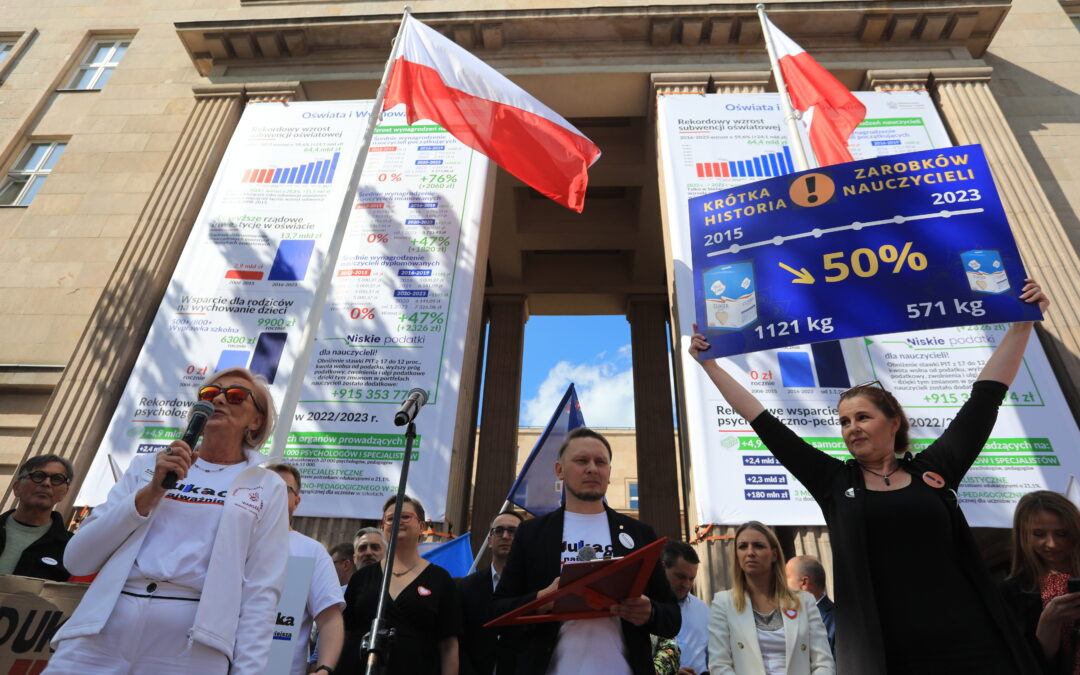Teachers have held a large protest outside the education ministry in Warsaw, demanding the modernisation of the education system, pay rises, and an end to what they claim is the politicisation of schools.
Ahead of the protest on Friday, education minister Przemysław Czarnek displayed large banners on the building’s main entrance detailing increases in education funding implemented by the government.
Teachers, however, argue that the increases are not even enough to compensate for the high inflation Poland has been suffering for two years. They also accused the minister of carrying out politically and ideologically inspired reforms rather than acting for the benefit of staff and students.
“The morning of the 15th [of October] will be the end of Czarnek,” they chanted, referring to general elections planned on that date, reports the Gazeta Wyborcza daily.
Związkowcy zrzeszeni w @ZNP_ZG domagają się przede wszystkim 20% podwyżek z powodu wysokiej inflacji.
Więcej: https://t.co/YEeEu8mQAE— Radio ZET NEWS (@RadioZET_NEWS) September 1, 2023
In a petition prepared by the Polish Teachers’ Union (ZNP), they demand, among other things, “education for the 21st, not the 19th century”, including class sizes of no more than 20 students, free textbooks, and the provision of support from psychologists and pedagogues.
They are also calling for pay increases of 20%, backdated to July; for teachers’ salaries to be linked to the average wage in the country; and for a legal guarantee of state education expenditure of no less than 3% of GDP.
“Today we have record high inflation and record low salaries,” the petition reads. “We are fed up with the minimum wage of an assistant being 5 zloty more than the minimum wage and the starting salary for a young teacher being 90 zloty more than the minimum wage!”
Currently, the starting salary for a teacher is 3,690 zloty (€826) gross, while the minimum wage since July is 3,600 zloty. The minimum wage is set to rise to 4,300 zloty within the next year, while teachers’ salaries are set to increase by 12.3%, which would put the youngest teacher’s salary below the minimum wage, at 4,144 zloty.
The salary of some teachers in Poland has fallen below the minimum wage, with their union calling the situation “absolutely unacceptable”.
The government says teachers' salaries will soon rise by 8%, with pay backdated to cover the current period https://t.co/4cy4ccfbxq
— Notes from Poland 🇵🇱 (@notesfrompoland) January 14, 2023
“Minister Czarnek’s banners have nothing to do with reality,” said the ZNP’s head, Sławomir Broniarz, speaking in front of the ministry.
“We supposedly have enormous salaries and education financing is increasing. [But] if we refused overtime hours, education would come to a standstill. More than 70,000 pupils would stay at home,” he said, referring to a reportedly high level of teaching job vacancies in schools.
As of 1 September, only three days before school starts, more than 8,100 job openings are still unfilled, according to information gathered by a Facebook group, Dealerzy Wiedzy (Knowledge Dealers). Last year, 512,000 teachers were employed in Polish schools.
Poland’s main teachers’ union has encouraged members to stop using their own equipment and resources, such as computers, printers and stationery, for a week to draw attention to how much they contribute from their own pockets as they call for pay increases https://t.co/Xhcz8Vdu9i
— Notes from Poland 🇵🇱 (@notesfrompoland) September 30, 2022
Principals report that there would be more vacancies if it were not for teachers accepting overtime or retired teachers returning to work.
Members of another education organisation, Wolna Szkoła (Free School), present at the protest noted that a proposed law recently approved by parliament, which would restrict NGOs’ access to schools, will deprive students of civic education.
“Children and young people [will be] fed indoctrination and a one-sided, distorted version of history and the present will be subject to systemic indoctrination,” Wolna Szkoła wrote on Facebook.
A law banning groups that “promote the sexualisation of children” from schools has been approved by parliament
The conservative government says such measures are necessary to protect children. But NGOs say it is a further attempt to restrict sex education https://t.co/hd1TFnoKLc
— Notes from Poland 🇵🇱 (@notesfrompoland) August 18, 2023
Czarnek, however, rejected the teachers’ allegations and demands, accusing the ZNP of lies.
“If the ZNP did not exist, teachers would be in a much better situation,” he said in an interview with Radio Zet. Asked what grade he would give himself as education minister, he said 4+ (on a six-point scale, where six is the highest).
However, in May, when pollster SW Research asked the public what grade they would give Czarnek, almost half (46%) gave him the lowest score of one. A further 15% gave him two, 9% gave him three, 9% gave him four, 6% gave him 5 and just 4% gave him the top mark of 6.
Another poll by the same agency in February this year found that 43% regard Czarnek as Poland’s worst education ministry of the last two decades, well ahead of all other figures who have filled the position.
Poles see the current education minister, Przemysław Czarnek, as the worst in the last two decades, finds a poll by SW Research for @rzeczpospolita.
43.1% chose Czarnek, an ultraconservative figure, as the worst, ahead of Roman Giertych (11.7%) in second https://t.co/UT1klaKdij pic.twitter.com/EY7br4Rf99
— Notes from Poland 🇵🇱 (@notesfrompoland) February 27, 2023

Notes from Poland is run by a small editorial team and published by an independent, non-profit foundation that is funded through donations from our readers. We cannot do what we do without your support.
Main image credit: Jacek Marczewski / Agencja Wyborcza.pl

Alicja Ptak is deputy editor-in-chief of Notes from Poland and a multimedia journalist. She has written for Clean Energy Wire and The Times, and she hosts her own podcast, The Warsaw Wire, on Poland’s economy and energy sector. She previously worked for Reuters.



















